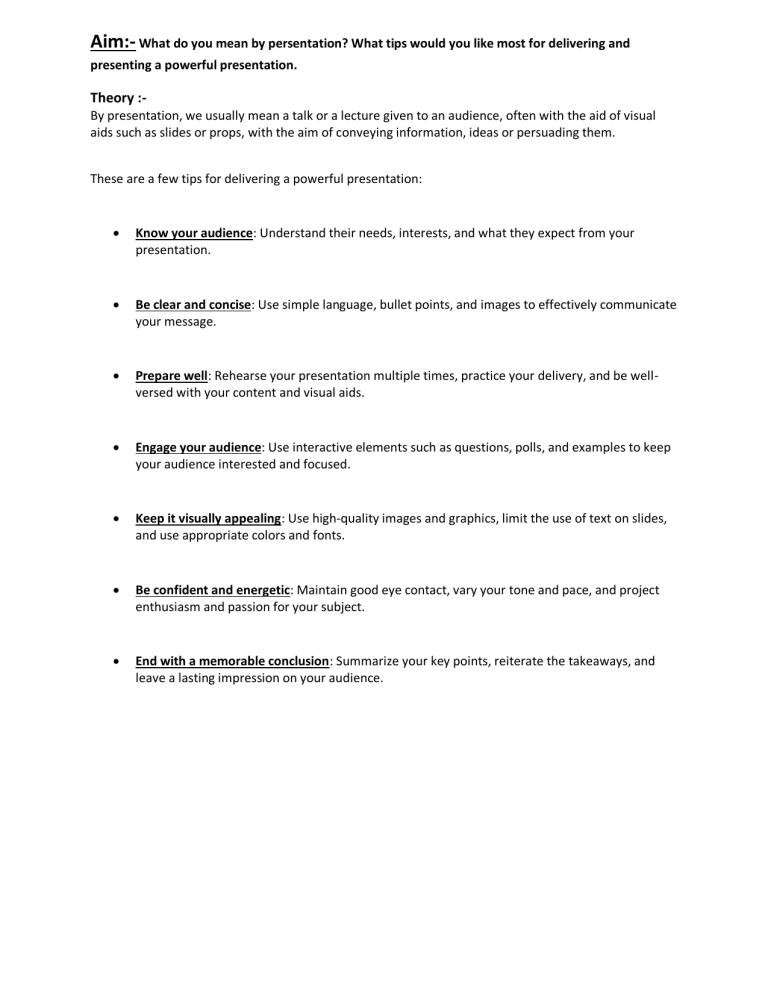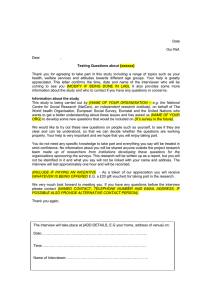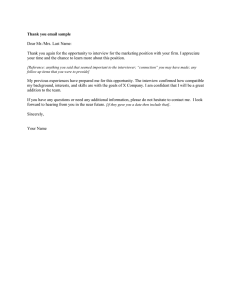
Aim:- What do you mean by persentation? What tips would you like most for delivering and presenting a powerful presentation. Theory :By presentation, we usually mean a talk or a lecture given to an audience, often with the aid of visual aids such as slides or props, with the aim of conveying information, ideas or persuading them. These are a few tips for delivering a powerful presentation: Know your audience: Understand their needs, interests, and what they expect from your presentation. Be clear and concise: Use simple language, bullet points, and images to effectively communicate your message. Prepare well: Rehearse your presentation multiple times, practice your delivery, and be wellversed with your content and visual aids. Engage your audience: Use interactive elements such as questions, polls, and examples to keep your audience interested and focused. Keep it visually appealing: Use high-quality images and graphics, limit the use of text on slides, and use appropriate colors and fonts. Be confident and energetic: Maintain good eye contact, vary your tone and pace, and project enthusiasm and passion for your subject. End with a memorable conclusion: Summarize your key points, reiterate the takeaways, and leave a lasting impression on your audience. Aim:- What do you mean by Group Discussion? Discuss the personality traits of the participants that are evaluated in a group discission. Theory:Group discussion refers to a method of communication where a small number of people exchange their views, ideas, and thoughts on a specific topic with the goal of arriving at a solution or making a decision. In a group discussion, the following personality traits of the participants are commonly evaluated: Leadership qualities: ability to lead the discussion, guide the group towards a conclusion, and make effective decisions. Communication skills: ability to express thoughts clearly, listen actively, and respond to others effectively. Interpersonal skills: ability to work in a team, build rapport with others, and resolve conflicts effectively. Analytical skills: ability to analyze problems, evaluate options, and make sound judgments. Confidence: ability to express opinions and ideas assertively and handle pressure in group settings. Adaptability: ability to adjust to changing circumstances and be flexible in problem-solving. Creativity: ability to generate new ideas and think outside the box. Emotional intelligence: ability to understand and manage emotions and build positive relationships with others. Initiative: ability to take the lead in driving the discussion forward and being proactive in finding solutions. Aim:- What do you mean by job interview? Discuss the process of job interview. How body language is important to succeed in an interview. Theory:A job interview is a process in which a potential employer evaluates a job applicant's skills, qualifications, and interest in the job being offered. It typically involves a series of questions asked by the interviewer and answers provided by the job candidate. The process of a job interview typically includes the following steps: Preparation: Research the company and position, prepare answers to common interview questions, and plan what to wear and bring to the interview. Greeting: Arrive on time and greet the interviewer with a firm handshake, smile, and good eye contact. Question and answer session: The interviewer will ask questions about your qualifications, work experience, and interests. It's important to listen carefully, answer truthfully, and provide specific examples when asked. Assessment of fit: The interviewer will also assess whether you would be a good fit for the company culture and the team. Closing: At the end of the interview, thank the interviewer for their time, express your interest in the position, and ask about the next steps. As for, Body language is an important aspect of a job interview as it can convey confidence, interest, and professionalism. Some tips for good body language during an interview include maintaining good eye contact, sitting up straight, avoiding fidgeting, and using gestures to emphasize points. Additionally, being mindful of your facial expressions, posture, and tone of voice can help to make a positive impression on the interviewer.


